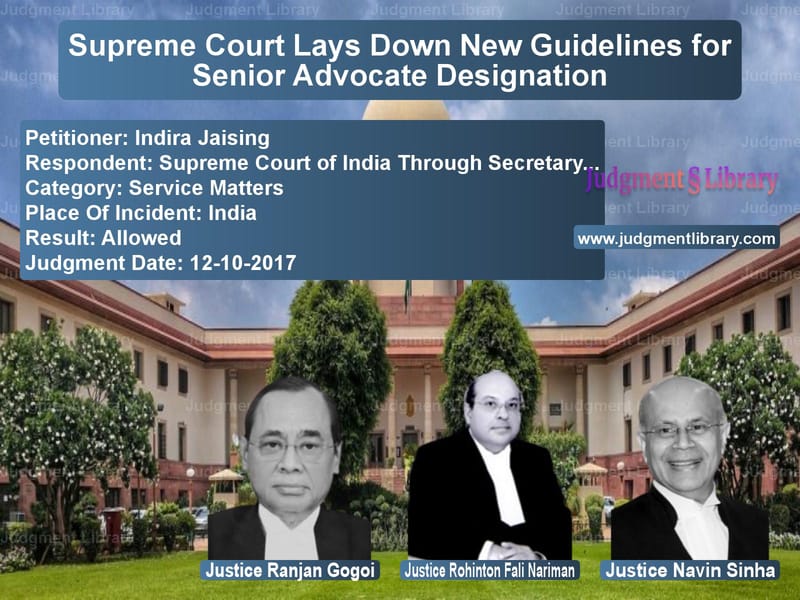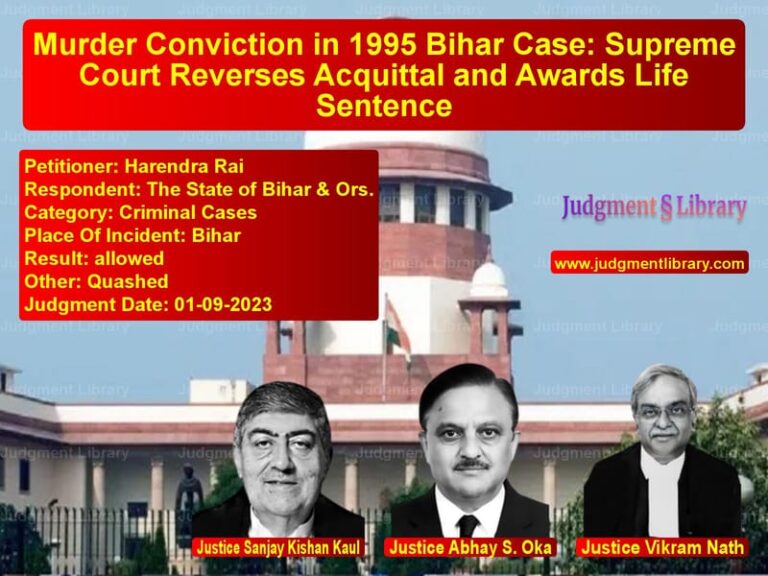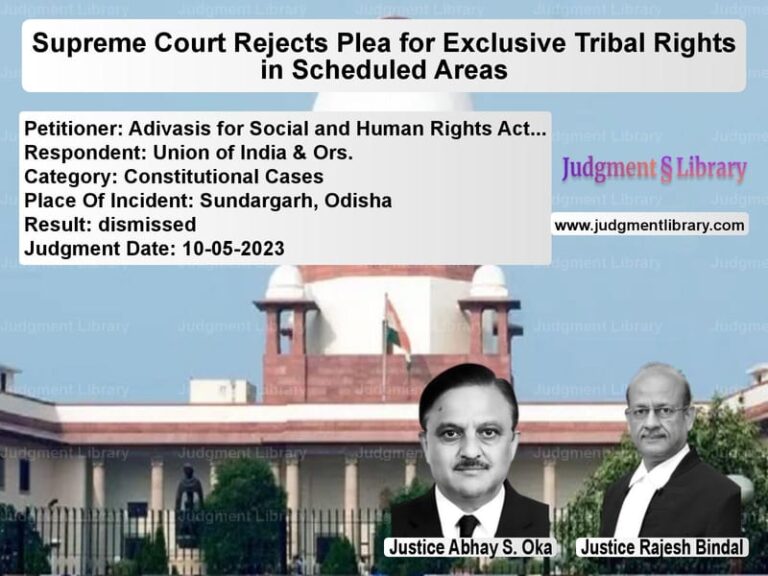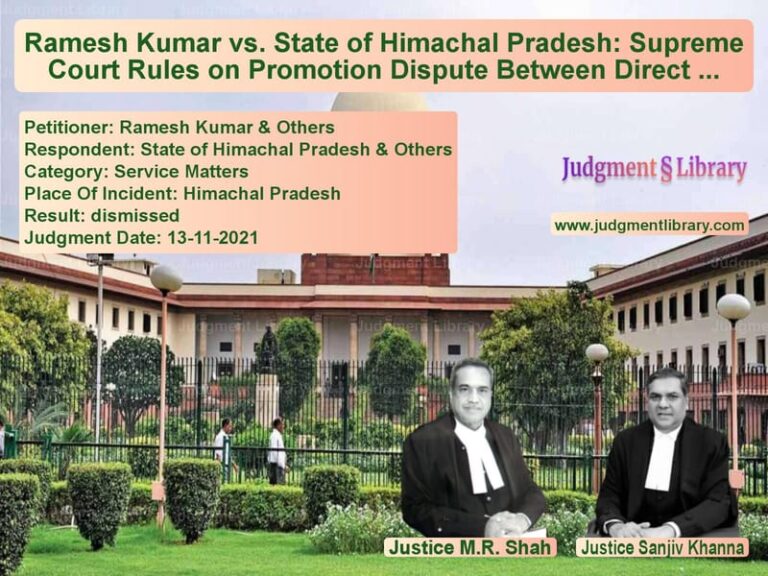Supreme Court Lays Down New Guidelines for Senior Advocate Designation
The Supreme Court of India, in a landmark judgment, has laid down new guidelines to bring transparency, fairness, and uniformity in the process of designating Senior Advocates in the country. The case, Indira Jaising vs. Supreme Court of India Through Secretary General & Ors., was filed by Ms. Indira Jaising, a Senior Advocate herself, who challenged the existing system of designating Senior Advocates as arbitrary and lacking transparency.
Background of the Case
The process of designating advocates as Senior Advocates is governed by Section 16(2) of the Advocates Act, 1961. As per this provision, the Supreme Court and High Courts have the discretion to designate advocates as Senior Advocates based on their standing at the Bar and their legal expertise. However, the criteria for this selection have historically been unclear and largely dependent on the subjective discretion of the judges.
Ms. Jaising’s petition sought to reform the system, arguing that the current process lacked transparency, accountability, and a fair assessment of an advocate’s legal expertise and contribution to the field of law.
Key Legal Issues Raised
- Whether the existing selection process violated Article 14 (equality before law) by being arbitrary.
- Whether the Supreme Court and High Courts needed to adopt structured guidelines to ensure fair selection.
- Whether public scrutiny of the selection process was necessary to bring accountability.
Petitioner’s Arguments
Ms. Indira Jaising made the following arguments before the Court:
- The existing system of designating Senior Advocates lacked objective criteria and relied entirely on the subjective opinion of the judges.
- The selection process was opaque, as no reasons were given for acceptance or rejection of an advocate’s application.
- The system did not ensure representation from diverse backgrounds, which led to gender and regional disparities.
- Advocates from marginalized communities, those practicing in non-commercial fields like human rights law and constitutional law, were often overlooked in favor of commercial law practitioners.
- She proposed a structured evaluation system based on measurable factors, including legal contributions, pro bono work, landmark cases argued, and peer review.
Respondent’s Arguments
The Supreme Court, through the Secretary-General and the Attorney General of India, defended the existing process but acknowledged the need for reforms. The respondents contended:
- The designation of Senior Advocates was a privilege granted to those who had demonstrated exceptional ability in law.
- The full court of judges collectively exercised discretion while evaluating candidates, which ensured a balanced assessment.
- While transparency could be improved, full public disclosure of voting records was unnecessary and could discourage candid discussions among judges.
Supreme Court’s Observations
The Supreme Court recognized the merit in Ms. Jaising’s arguments and acknowledged that reforms were necessary to ensure fairness and transparency. The Court made the following key observations:
- “The current system lacks objectivity, and there is a need for a structured, merit-based process.”
- “A balance must be maintained between judicial discretion and structured assessment.”
- “A detailed, point-based assessment should be introduced to bring fairness to the selection.”
New Guidelines Issued
The Supreme Court issued a set of structured guidelines for the designation of Senior Advocates:
- A Permanent Selection Committee will be established, headed by the Chief Justice of India, two senior-most Judges, the Attorney General (Advocate General for High Courts), and a nominated senior advocate.
- A Secretariat will be set up to collect, verify, and process applications.
- Applications will be assessed based on measurable criteria such as:
- Number of years of practice.
- Landmark cases argued.
- Contributions to legal academia.
- Pro bono legal work.
- A point-based system will be introduced to assign scores based on merit.
- All applications will be published on the Court’s website for public scrutiny.
- The final selection will be made by the Full Court, with the decision published along with brief reasons.
Impact of the Judgment
This ruling marks a significant step towards transparency in the legal profession. The decision ensures:
- Elimination of favoritism and subjectivity in the selection process.
- Recognition of diverse contributions to the legal field, including academic and pro bono work.
- Encouragement of more women and advocates from marginalized communities to apply.
- Public scrutiny and accountability in the designation process.
The ruling strengthens the credibility of the legal profession and ensures that designations are awarded based on merit and contributions to the justice system. It is a significant reform in India’s legal framework and a step towards a more inclusive and fair legal profession.
Don’t miss out on the full details! Download the complete judgment in PDF format below and gain valuable insights instantly!
Download Judgment: Indira Jaising vs Supreme Court of Ind Supreme Court of India Judgment Dated 12-10-2017.pdf
Direct Downlaod Judgment: Direct downlaod this Judgment
See all petitions in Employment Disputes
See all petitions in Promotion Cases
See all petitions in Public Sector Employees
See all petitions in Recruitment Policies
See all petitions in Legal Malpractice
See all petitions in Judgment by Ranjan Gogoi
See all petitions in Judgment by Rohinton Fali Nariman
See all petitions in Judgment by Navin Sinha
See all petitions in allowed
See all petitions in supreme court of India judgments October 2017
See all petitions in 2017 judgments
See all posts in Service Matters Category
See all allowed petitions in Service Matters Category
See all Dismissed petitions in Service Matters Category
See all partially allowed petitions in Service Matters Category







